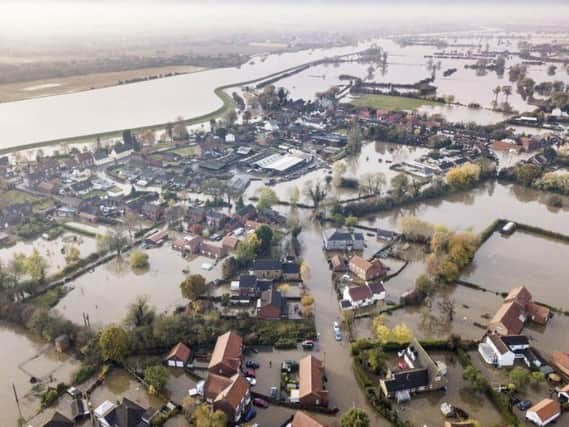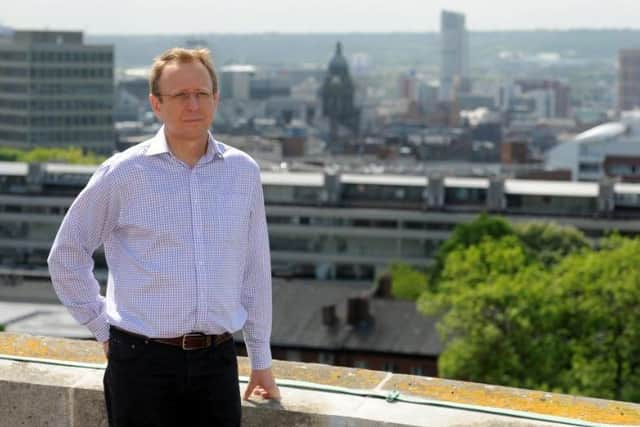How the Yorkshire and Humber Climate Commission aims to make the region healthier and happier


It’s a starkly serious situation – that’s something scientists can agree on.
But for Professor Andy Gouldson, director of the new Yorkshire and Humber Climate Commission, preventing environmental catastrophe is not impossible.
Advertisement
Hide AdAdvertisement
Hide Ad“I think climate change is very real and very urgent and we basically have 10 years to do something to avert major climate change, and dangerous runaway climate change, with all the impacts that come from that,” says the Professor of Environmental Policy at the University of Leeds.


“I’m very committed to on-the-ground, practical things and this (commission) is a great way of providing jobs and helping people to have a better life here in Yorkshire, and I feel kind of passionate about the local and regional possibilities but it also worries me, if we don’t react, what will happen.”
The commission launched on Wednesday last week, uniting representatives from the private and public sectors to tackle the environmental crisis.
The focus of what is now the biggest such commission in the UK will be on reducing carbon emissions as quickly as possible, and ensuring people in the region are prepared to cope with the impacts of climate change, such as flooding, heatwaves and sea level rise.
Advertisement
Hide AdAdvertisement
Hide AdIt has been backed by the Yorkshire and Humber Leaders Board and the 22 councils across the region they run, and partners include the Environment Agency, Yorkshire Water, Northern Powergrid, Northern Gas Networks and the Trades Union Congress.
If latest research is anything to go by, though, a majority in Yorkshire are sceptical about the likelihood that the country will reduce its emissions to a necessary degree.
Northern Gas Networks commissioned a poll carried out by YouGov which is contained in a recent Teesside University report, suggesting that just one in five residents in Yorkshire and the Humber (and about the same proportion as the country at large) think the UK will meet its net zero carbon target by 2050.
However it also found that close to two-thirds (64 per cent) of adults polled across Great Britain (from a sample size of 1,773) think the country should take the opportunity to rebuild the post-pandemic economy in a way that is greener.
Advertisement
Hide AdAdvertisement
Hide AdA large part of the job is done already, says Prof Gouldson, although huge challenges lay ahead.
He says: “Since the 2000s, we’re already 45 per cent down or so on our carbon footprint (regionally), so the first half has been done in 20 years – well, nearly – probably a bit more if you take into account Covid and what’s happened in the last year or so.
“And that’s happened without people really noticing it. And obviously the challenges are going to be more acute in the second half but on the other hand, the technologies have improved radically. The economics are much, much more effective than they were, for offshore wind, for example, and new things are coming through.
“So there’s no denying it will be challenging, but there are massive opportunities with it too, to green jobs and to improve resilience and competitiveness and to tackle fuel poverty and improve public health and just make the regional, a happier, healthier, more vibrant, prosperous place to be.
Advertisement
Hide AdAdvertisement
Hide Ad“I don’t buy the vision at all that it’s hair shirts and sacrifice. There’s massive opportunities for us here to become a much more prosperous and healthy region.
“And in a way that’s the entire point of the commission... to do our bit but also to make sure we get our bit from the opportunities that come from that.”
One of the most visible indications that climate change is happening in real time, in Yorkshire, is the repeat flooding events that the region has suffered over recent years.
The Government has been criticised for the speed of its responses to such events.
Advertisement
Hide AdAdvertisement
Hide AdBarnsley Central MP and Sheffield City Region Mayor Dan Jarvis, for example, last year suggested a £271m priority programme to protect over 10,300 and 2,800 businesses homes across South Yorkshire alone, but said that would still fall £175m short of the cash that was needed.
Defra said in September that it had built 59 new flood defences in Yorkshire since 2015, and nationally was doubling its investment to £5.2bn.
So is Prof Gouldson, who has worked on a wide range of issues relating to environmental policy and management since 1990, hopeful that Westminster will really listen to the commission?
“Very, actually,” he says. “We’ve had contact from Westminster several times in the last week wanting to hear more and get involved.
Advertisement
Hide AdAdvertisement
Hide AdWhether that’s Treasury, or Defra or BIS (the Department of Business, Innovation and Skills), but they’re all interested and one of the things Yorkshire can do is to show that it’s organised and ready and willing to pilot new initiatives, and then for Westminster to learn from us rather than us sit on our hands and wait for Westminster to act.
“We want to drive the agenda rather than responding to it and this is a good chance to show that we can do that.”
The Teesside University report argues that the North of England should be at the “forefront of the green revolution”, and highlights the possibilities of moving towards hydrogen-based energy – awareness and understanding of which is described as “very low”.
Blending hydrogen with natural gas would provide a “quick win” for carbon reduction as it requires no change of appliances, underground pipework, additional consumer costs or behaviour change, says the report, though converting to 100 per cent hydrogen is more complicated.
Advertisement
Hide AdAdvertisement
Hide AdBut it says: “The North of England is driving forward innovation in green infrastructure, acting as a catalyst to solve some of the UK’s big energy challenges. Green infrastructure clearly has an important role to play in the UK’s economic recovery post pandemic and developing an alternative energy source for heat is a crucial component within a strategy for achieving net zero emissions.
“In 2021, a number of important milestones will be achieved in projects taking place across the North of England, that will provide the necessary evidence to facilitate the UK’s transition strategy from natural gas to hydrogen as a fuel for the future.”
One such event is the United Nations Climate Change Conference, COP26, due to be held in Glasgow in November this year, when it is hoped Yorkshire’s ideas will play a part.
As Mr Gouldson put it last week: “There’s a massive fairness and inclusion aspects of this. Yorkshire knows all too well what a brutal energy transition feels like from 30 years ago. The last thing we want to do is repeat any aspects of that. It’s really important that this low carbon transition that people have brought with us and there was no one and no words left behind in that process.”
Yorkshire's commission is just the latest
Advertisement
Hide AdAdvertisement
Hide AdThe Yorkshire and Humber Climate Commission has been formed as part of the Place-based Climate Action Network (PCAN), a Economic and Social Research Council-funded research network that builds upon the model of the Leeds Climate Commission, which launched in 2017.
Since 2019, PCAN has supported the development of climate commissions around the UK, including in Edinburgh, Belfast, Surrey, Essex, Croydon, Lincoln, Doncaster, and what are described as “evolving commissions” in York and Kirklees.
In addition to Professor Andy Gouldson’s appointment as the director, Liz Barber, CEO of Yorkshire Water, has been announced as chairwoman of the commission.